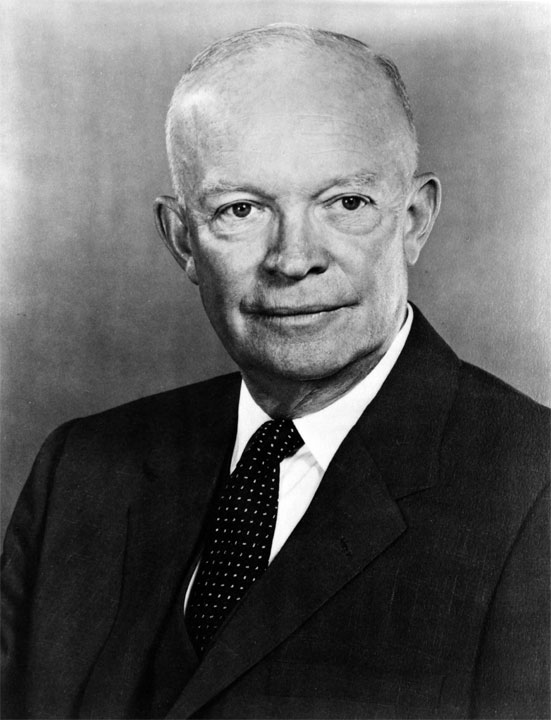Dwight Eisenhower
1890- 1969
American General and Politician

General Dwight David Eisenhower rose above many officers his senior to become the most important field commander in the US Army during World War II. Eisenhower led US forces in their invasion of North Africa. He then became the Supreme Allied Commander in Europe, commanding the invasion in Normandy and the subsequent Allied attack across Europe to Germany. Eisehower went on to become Army Chief of Staff, and then the first commander of NATO. In 1952, he was elected President of the United States.
President Eisenhower's first task upon assuming office was to fulfill his campaign promise to end the Korean War. Within six months, an armistice agreement was signed. Eisenhower instituted a new military policy for the US Armed Forces. That policy was called the "New Look." He envisioned smaller conventional forces, backed up by massive nuclear deterrence. The assumption was that the United States would respond to any attack with nuclear weapons.
In 1954, Eisenhower refused a request from the French for US intervention to save French troops fighting in Vietnam, at Dien Bien Phu. This refusal is widely thought to have dealt a final blow to the French as a force in Indochina, and forever altered the Allies' relationship.
The death of Stalin in 1953 allowed for a reassessment of US-Soviet relations. In 1955, a summit meeting was held between the US, the British, the French and the Soviets. During the meeting, Eisenhower proposed the policy of "open skies." Under this program, the airspace of each country would be open to be photographed by the air forces of the others.
Eisenhower suffered a heart attack in 1955, which incapacitated him for over two months. In 1956, American pressure on the British and French forced their withdrawal from the Suez Canal, which they had seized from Egypt. A few months later, Israel was forced to withdraw from the Sinai, due to the same sort of pressure.
In 1957, Eisenhower outlined what became known as the "Eisenhower Doctrine," under which the United States would aid any country threatened by Communist aggression or subversion. The next year he dispatched troops to Lebanon to support a pro-Western government there.
Near the end of his Presidency, an American U-2 spy plane was shot down over the Soviet Union, and its pilot captured. This put considerable strain on Soviet- American relations.
After his retirement from the Presidency, Eisenhower lived on his farm in Gettysburg, Pennsylvania and wrote a number of books, including Mandate for Change (1963) and Waging Peace (1965).
 >
>